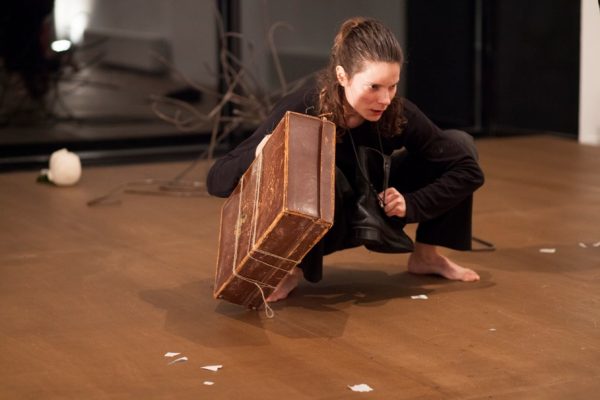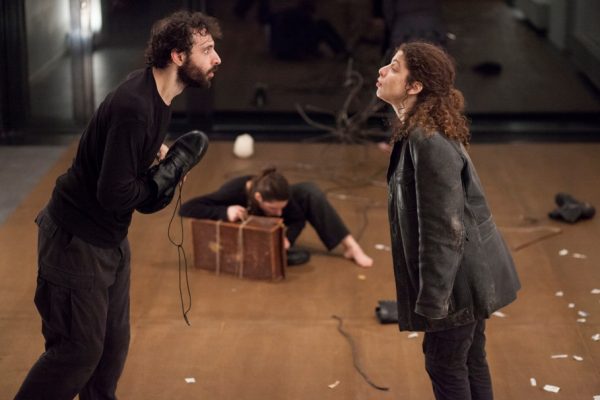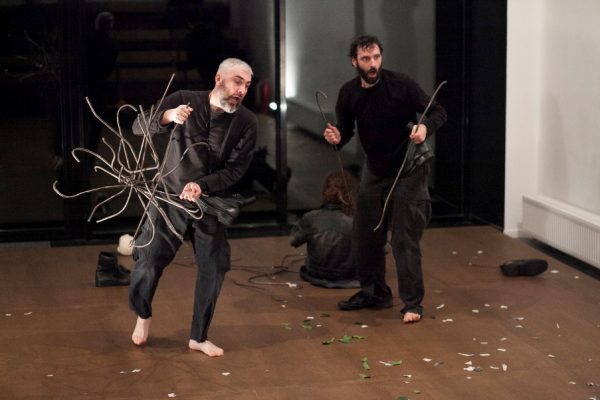WAITING FOR GODOT by Samuel Beckett
Τιμή
Admission €12 Regular €8 Unemployed Students
Event Details
Our performance is played on the ruins of the world, in a future more or
Event Details
Our performance is played on the ruins of the world, in a future more or less close to us, where all the wounds of the present and the past of humanity are open … But also the expectations … At this marginal point of humanity’s existence, which are the few possible conditions for restarting life, a life that is worth living for? In “Waiting for Godot” we found two possible answers and there we based our work:
The effort to communicate and coexist with the Other, with the one we have before us, despite all obstacles, even when these look unsurpassed! But also the effort of communicating with the Other within us, with this unknown and dark area of repressed desires and fears, of forgotten senses and instincts, the area of the animal and the divine, where madness and dreams are born.
This is the journey we tried to take to the Other within and to the Other outside, in front of us (…)
Savvas Stroumpos, Director
CREDITS
Translation: Thomas Symeonidis
Direction: Savvas Stroumpos
Stage installation: Elias Papanikolaou
Light design: Costas Bethanis
Performers:
Vladimir: Christos Kontogeorgis
Estragon: Konstantinos Gogoulos
Pozzo: Evelyn Assouad
Lucky: Ellie Ingli
PHOTO GALLERY AND VIDEO
Trailer: https://www.youtube.com/watch?v=N_5X14CYjcI
Website: http://simeiomiden.gr/performances/
Vimeo channel: https://vimeo.com/simeiomiden/videos
Trailer of the performance: https://www.youtube.com/watch?v=N_5X14CYjcI
English website of the performance: http://simeiomiden.gr/performances/waiting-for-godot/
vimeo channel of the group’s performances: https://vimeo.com/simeiomiden/videos
-
Directors note
Our performance is played on the ruins of the world, in a future more or less close to us, where all the wounds of the present and the past of humanity are open … But also the expectations … At this marginal point of humanity’s existence, which are the few possible conditions for restarting life, a life that is worth living for? In “Waiting for Godot” we found two possible answers and there we based our work:
The effort to communicate and coexist with the Other, with the one we have before us, despite all obstacles, even when these look unsurpassed! But also the effort of communicating with the Other within us, with this unknown and dark area of repressed desires and fears, of forgotten senses and instincts, the area of the animal and the divine, where madness and dreams are born.
This is the journey we tried to take to the Other within and to the Other outside, in front of us (…)
Savvas Stroumpos, Director
-
Reviews
It is an art, paraphrasing Grotowski, which violates our limits, extends our boundaries, fills our void, and contributes to our completion. By exploring and evolving this art, the Semeio Meden Ensemble (Zero Point), surprises you, calling you in each of its performances to put aside the established perspective and to look for a different way of living in the theatre.”
“Prin”, Kiriaki Agapitou
“Waiting for God” (…) finds its perfect application in the bold, directorial attempt of Savvas Stroumpos, based on the excellent translation by Thomas Simeonidis. (…) With a fresh postmodern look and with the stage installation of Elias Papanikolaou, Savvas Stroumpos penetrates the existential agony of the heroes. Without exaggerations, he produces a theatrical act of dramatic depth, where the main characteristics of the protagonists unfold. The actions are created at a level of vigor and in a somewhat “gothic” atmosphere in some parts, which excite the spirit of the spectator.
“Culturenow.gr”, Zoi Toli
Savvas Stroumpos confronts the textual beast which Beckett created in the image and likeness of the deformity and dysfunction of the imperfect human being. […] the director did not fear his explosive, “insane” (“We are all born mad, some remain”) material. On the contrary, with care, boldness and measure, based on the excellent translation by Thomas Simeonidis, he reveals its labyrinthial philosophical and literary polysemy, guiding his exceptional actors away from obvious and hidden obstacles.
“Nea Selida”, Ioanna Blatsou
The actors do not play their roles; they experience them, which is one of the most dynamic features of the group. They are excellent at all levels, with a stunning body movement that not only produces actions but also emotions and exerts their interpretive means. They have rare chemistry, a product of harsh, long-time, systematic teamwork and they move perfectly tuned to the inner rhythms of the performance.
“episkinis.gr”, Maria Kiriaki
The performance transfers the spectator to an undetermined landscape after the disaster, replacing the mid-hats (perhaps the most stable element of the project) with military boots. True to the directorial line of a “poor theater”, the director takes full advantage of the physical and vocal skills of the actors. “O dromos tis aristeras”, Spyros Kakouriotis The performance of Savvas Stroumpos has something rare: it is a consciously “Shakespearean” reading of Beckett through the genius of Albert Camus, which rightfully justifies him. (…)
“Avgi”, Leandros Polenakis
-
Biography
Savvas Stroumpos
Savvas Stroumpos was born in 1979 in Athens. He graduated from the Drama School of the National Theatre of Greece (2002). He holds an MA with Merit from the Department of Theatre Practice, University of Exeter, UK, where he studied with Phillip Zarrilli (2003).
As an assistant director, he collaborated with Theodoros Terzopoulos in the following performances: Aeschylus’ The Persians, Meyerhold Center, Moscow (2003), Sophocles’ Oedipus Rex, Alexandrinsky Theatre, St. Petersburg (2006), Aeschylus’ Prometheus Bound, State Academy of Dramatic Art, Beijing, China (2008), Sophocles’ Antigone, State Academy of Dramatic Art, Beijing, China (2011), Samuel Beckett’s Endgame, Alexandrinsky Theatre, St. Petersburg (2014), Euripides’ The Bacchae, Electro Theatre, Stanislavski (2015), Sophocles’ Antigone, Wilma Theatre, Philadelphia, USA (2015), Euripides’ The Bacchae, National Theatre of Taiwan (2016), Euripides’ The Trojan Women, Cultural City of Pafos, Cyprus (2017).
As an actor of Attis Theatre, he participated in the following performances: Boris Pasternak’s Hamlet a Lesson (2003), Aeschylus’ Prometheus Bound (2003), Aeschylus’ Epigone (2004), Samuel Beckett’s Ohio Impromptu (2004), Ajax – the Madness (2004), Costas Logaras’ The Last Mask (2006), Aeschylus’ The Persians (2006), Marios Pontikas’ Cassandra (2007), Ajax – the Madness, 2nd version (2008), Aeschylus’ Prometheus Bound (2010).
With Semeio Meden Ensemble (Zero Point) he has directed: Franz Kafka’s In the Penal Colony (2009), William Shakespeare’s As You like It (2010), Albert Camus’ The Justs (2011), Franz Kafka’s Metamorphosis(2012), Georg Buchner’s Woyzeck (2013), Franz Kafka’s In the Penal Colony (2014 – 2nd version), Yevgeny Zamiatin’s We (2015), Heiner Müller’s The Mission: A Memory of a Revolution (2016), Dimitris Dimitriadis’ Troas (2017), Gyorgy Kurtag’s Kafka Fragments (2018), Samuel Beckett’s Waiting for Godot (2018).
Semeio Meden Ensemble (Zero Point)
Semeio Meden Ensemble (Zero Point) was created in 2009. The group’s work focuses on the research of the performer’s and director’s craft, through a collective creative process, in confrontation with classical and modern texts and writers.
So far Zero Point has staged, among others, Franz Kafka’s In The Penal Colony (2009), William Shakespeare’s As You Like It (2010 ), Albert Camus’ The Justs ( 2011-12 ), Georg Buchner’s Woyzeck (2013), Heiner Müller ‘s The Mission: A Memory of a Revolution (2016), Dimitris Dimitradis’ Troas (2017).
Ώρα
7 (Κυριακή) 21:00 - 8 (Δευτέρα) 23:00(GMT+00:00)
Τοποθεσία
‘AVLAIA’ THEATRE


